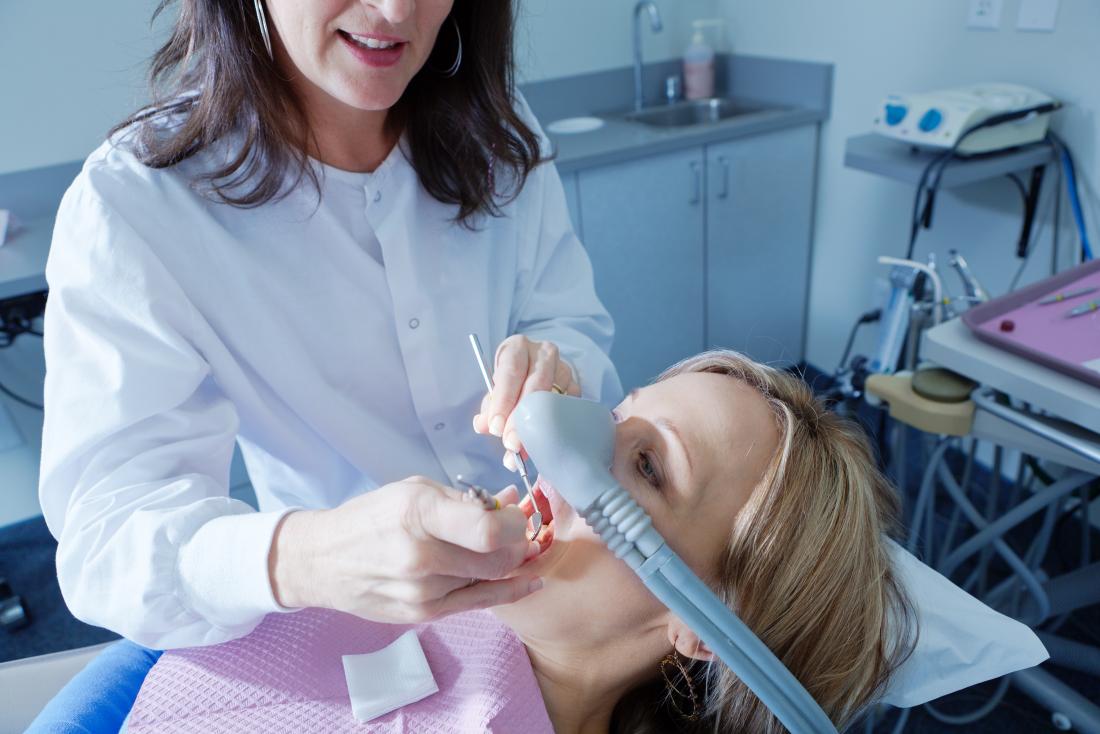People often refer to nitrous oxide as laughing gas. Nitrous oxide slows down a person’s reaction time and causes a feeling of euphoria. Once a person uses nitrous oxide, it does not take long before they feel the effects of the gas. Once people stop using it, the effects wear off quickly.
Nitrous oxide is generally safe to use for medical and dental procedures. Medical uses include procedures on toddlers, children, and adults. However, as with any drug, there is a risk of short and long term health effects. There may also be the potential for overdosing.
Short term

Short term side effects from nitrous oxide can include dizziness, nausea, or vomiting.
Short term side effects are not very common, but they can occur. The most common reason a person may experience short term side effects is due to inhaling the gas too quickly or inhaling too much.
In these circumstances, a few of the most common side effects of nitrous oxide include:
It is also possible that a person may experience a sensation of being high when they receive nitrous oxide. They may also be aware of sound distortions.
During or immediately following the administration of nitrous oxide, a healthcare provider may also give a person oxygen.
When a person receives oxygen after a medical procedure, it is typically to clear the remaining nitrous oxide from their body. This helps the individual regain alertness and can help prevent a headache.
People may feel sluggish or not alert following the inhalation of nitrous oxide. This effect typically wears off quickly.
People can drive themselves to and from a medical procedure if they receive nitrous oxide, as long as they give themselves adequate time to recover from the gas.
To help avoid stomach issues, a person should eat a light meal and avoid eating a heavy meal for several hours after their procedure.
Finally, people should be aware of possible allergic reactions to nitrous oxide. These may occur if someone is experiencing nitrous oxide for the first time, such as a child.
Symptoms to look out for include:
If a person experiences any of these during or after receiving nitrous oxide, they should seek medical help immediately.
Long term
There is little evidence to suggest that nitrous oxide causes any serious long term side effects.
Most of the side effects wear off quickly after use of the gas. A person should still let their healthcare provider know if they experience any unusual side effects or if these last for a few hours to days following their procedure.
Although the average person may not experience any long term side effects, extended exposure, or intentional misuse of nitrous oxide may lead to health problems. Overexposure can lead to anemia or a vitamin B-12 deficiency. The latter can cause nerve damage, which can lead to a person’s limbs, fingers, or toes going numb.
Finally, not everyone is a good candidate to receive nitrous oxide. In some cases, pre-existing medical conditions may make taking nitrous oxide less safe.
Some potential reasons healthcare providers may avoid giving a person nitrous oxide include:
- vitamin B-12 deficiency
- a history of mental health conditions
- being in the first trimester of pregnancy
- a history of substance abuse
- having the enzyme condition methylenetetrahydrofolate reductase deficiency
- a history of respiratory illnesses
Overdose

If a person overdoses on nitrous oxide, they may experience tightness in the chest or choking.
Though typically very safe, there is a possibility that a person could overdose on nitrous oxide. The most common reasons for an overdose include getting too much of the gas at once and long term exposure.
A person working at a practice that uses or stores nitrous oxide is most at risk for long term or accidental exposure.
As a patient, a person is not likely to experience an overdose. This is because the amount necessary to do so is much higher than they receive during a procedure.
If someone does experience an overdose, they may have any of the following symptoms:
- tightness in the chest
- eyes, throat, and nose irritation
- difficulty breathing -hallucinations or psychosis
- choking
- blue tint to the toes, lips, or fingers
- increased blood pressure and risk of heart attack or stroke
- seizures
- increased heart rate
If an individual has too much nitrous oxide at once with limited or no oxygen, they may also develop brain damage.
If someone suspects they have overdosed on nitrous oxide, they should seek immediate medical attention. If left untreated, a person could go into a coma or die.
When people use nitrous oxide as a recreational drug, the gas belongs in the inhalant category. According to the National Institute on Drug Abuse, younger teens or preteens are more likely to use inhalants than older teens.
Since a high only lasts for a few seconds, a user will often repeatedly take a hit of the gas over several minutes or hours, which can lead to an accidental overdose.
Takeaway
Nitrous oxide is typically a safe drug that helps sedate a person before and during dental and other same day procedures. The effects of the drug typically come and go quickly upon starting and stopping the gas.
If a person experiences a side effect, they are typically short lived and go away after stopping the gas. If effects last for a longer period or a person experiences symptoms of an allergic reaction, they should seek medical attention immediately.
Though rare, it is possible to overdose on nitrous oxide. Workers at facilities that use or store nitrous oxide and those that abuse it are most at risk. A person has little chance of overdosing during routine care.
